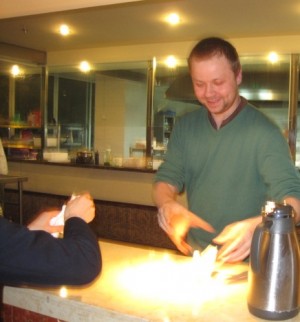Living Abroad: One Business Man’s Ventures in China
Between family time and his ambitious work habits, it came as zero surprise when he disclosed that he doesn’t socialize with the foreign community anymore due to being too busy.
“I work 7 a.m. to 8 p.m. between all my jobs and when I get home I just want to watch CSI,” he said.
While he seemed to generate new ideas throughout our talk as casually and frequently as most of us draw breath, Szpakowski has learned from early failures. He expressed his desire to bring Polish sausages and chocolates to Zhengzhou with the same jovial excitement he applied to all of his ideas, but perhaps having learned from the bakeries, confessed he doubted they would ever catch on.
“I could buy them from the Chinese province bordering Russia, but you know…” he paused and thought for a moment. “Just because we like something does not mean that the Chinese will. The chocolate would be too sweet; the sausage would have too much meat…that kind of thing.”
This is hardly the sole area in which Szpakowski sees a cultural gap between his homeland and his adopted home. He explained that the cultural exchange between China and Poland is far less-developed than between China and certain other Western countries.
“Poland is not so attractive to the Chinese, education-wise. Most Chinese students now learn English starting in Primary School, so they want to go someplace where they can use it. Many want the US experience. With business, things are maybe better, but many Poles cannot speak fluent Chinese, which doesn’t help.”
Needless to say, after nearly 10 years here, he can count himself among that minority who are quite fluent, something he displayed casually when interacting with some locals who were sharing the McDonald’s with us. It comes from a mixture of his constant business ventures, his predominantly Chinese circle of friends, and the fact that he has only left China once since his arrival. He returned to Poland for a year and a half in 2003 and hasn’t been back ever since.
As such, when asked if he’s ever tempted to make another visit home, his response showed how thoroughly bound he feels to China.
“Maybe in the future, but not now; I’ve been away so long it’d be strange. Plus, in China you can’t do business without guanxi – relationships. You need to know somebody in the government or have somebody to recommend you. And I know a lot of people.”
He’s gathered that collection of associates over a long time, in which he’s seen China’s developmental growth spurt from the ground level. When first prompted about the changes he’s witnessed, Szpakowski was surprisingly dismissive of them, as though they haven’t been exceptionally significant. I remained on the subject, however, and he seemed to rethink his answer. He looked around and gestured to our surroundings.
“Well, we’re in one of many McDonald’s,” he started. “The first McDonald’s did not come to Zhengzhou until 2002 or 2003. There has been a big influx of foreign products and ideas. I think it’s easier for Zhengzhou people to accept Western ideas now.”
But it’s not, he was sure to point out, necessarily a better environment for would-be international entrepreneurs.
“The economy was less saturated when I came here. Now it’s a little difficult to open something and have it go through.” But lest it seem he was unhappy with the situation, he was quick to follow that “it’s harder, but if you know what to do it’s still easy.”
“I won’t be going anywhere for some time. I’m making good money and I don’t want to jeopardize it,” he told me, eyes lighting up as wide and bright as when he pitched me job offers earlier. “Life for foreigners in China is good.”


